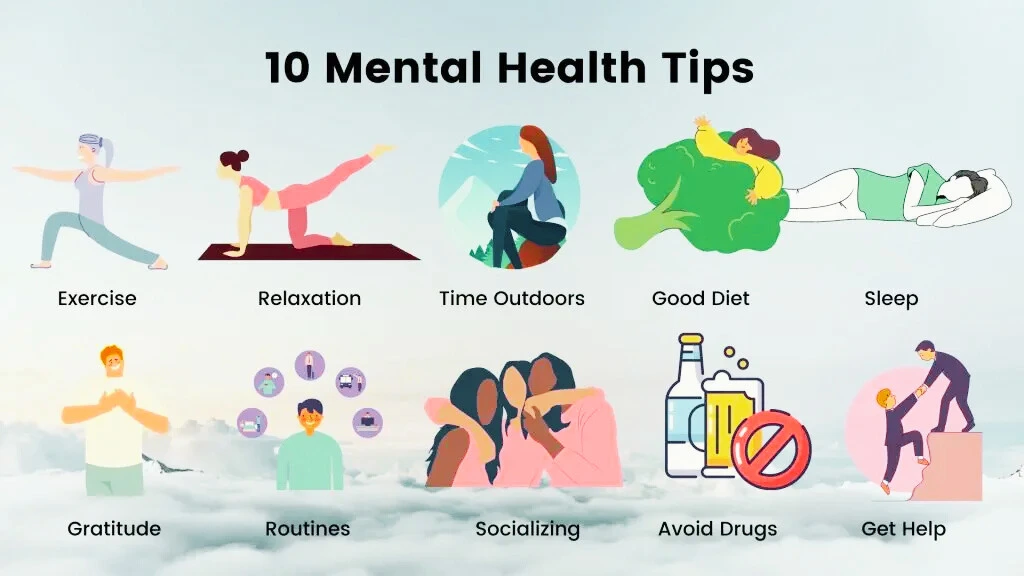How to Improve Mental Health Naturally at Home: Daily Strategies That Work

If you’ve been searching for how to improve mental health naturally at home, you’re in the right place. In this post, we’ll explore effective, research-backed ways to boost your mood, reduce stress, and build resilience, all without leaving your front door. Practical, doable, and completely natural, these tips are designed to enhance your well-being in a truly sustainable way.
1. Move Your Body: Exercise for Mind & Mood
Physical activity isn’t just good for your body, it’s vital for your mind, too. Just 30 minutes of moderate exercise, like brisk walking, yoga, or even dancing, can release “feel-good” endorphins and improve mental clarity. In fact, a review of 133 studies found that moderate-intensity exercise and mindful movement (like yoga or tai chi) consistently enhance memory, mood, and cognitive function.
Tip: Aim for 3–5 sessions per week of at least 20 minutes. Try yoga, dance videos, or a simple home workout circuit.
2. Connect with Nature at Home
Even if you’re city-bound, you can bring nature indoors. Studies show that exposure to natural environments, whether outside in parks or just having houseplants, can lower stress hormones, enhance mood, and improve focus. Nature-based guided imagery or “forest bathing” (shinrin-yoku) are accessible home practices that calm the nervous system.
Tip: Keep a potted plant, open windows daily, use natural sounds in the background, or spend 20 minutes in a nearby green space (even your yard).
3. Prioritize Quality Sleep
Sleep is the cornerstone of mental health. Most adults need 7–9 hours of consistent, restful sleep. Disrupted sleep patterns contribute to mood swings, impaired concentration, and increased stress.
Tip: Create a calming bedtime routine: dim the lights, avoid screens for at least an hour, keep your room cool, and go to bed at the same time daily.
4. Fuel Your Brain: Balanced Nutrition
Your mental health is deeply connected to nutrition. Studies link increased fruit and vegetable intake with improved mood and energy. Omega-3s (from fish, nuts, seeds) and vitamins B6/B12 support neurotransmitter function and emotional balance. It’s also wise to limit caffeine, refined sugar, and alcohol, which can disrupt mood and energy.
Tip: Start each day with a balanced breakfast of protein, whole grains, and fiber-rich fruits or veggies.
5. Build Connection and Kindness
Social connection and kindness aren’t optional, they’re essential. The NHS highlights how relationships strengthen a sense of belonging, self-worth, and emotional support nhs.uk. Similarly, volunteering or simple acts of kindness boost happiness and emotional resilience.
Tip: Schedule regular low-effort invites, reach out to someone you miss, or volunteer (in-person or online) once a month.
6. Practice Mindfulness & Relaxation Techniques
Mindfulness and relaxation, like guided imagery, deep breathing, progressive muscle relaxation (PMR), and Qigong, can significantly reduce stress, anxiety, and improve mental wellness. Even 6 minutes of daily meditation boosts mood, focus, and stress resilience.
Tip: Use free apps or YouTube to guide 5–10 minutes of deep breathing or body-scanning each morning or evening.
7. Declutter Your Space for Peace of Mind
Physical clutter can clutter your mind. Decluttering promotes calm and control, reducing cortisol and improving focus. Even one tidy area can shift your emotional tone.
Tip: Dedicate 10–15 minutes daily to clear one area, like your desk or dresser. Keep things organized to maintain mental space.
8. Journal Gratitude & Micro-Joys
Gratitude journaling is simple but transformative. Listing three things you’re grateful for daily helps rewire your brain for positivity and better sleep. Intentional “micro-joy” moments, like savoring your coffee, bring calm and presence.
Tip: Write three gratitudes each evening and choose one small joy to focus on in the morning.
9. Learn Something New or Try an Old Hobby
Learning new skills boosts confidence, purpose, and mental agility.uk. Even revisiting old hobbies, playing music, DIY crafts, cooking, can shift your mood and creativity.
Tip: Spend 20–30 minutes weekly learning or practicing a hobby, painting, writing, or a language.
10. Incorporate Music, Grounding, and Self-Care
Music therapy, grounding practices (like earthing with bare feet on grass), and herbal remedies (lavender, chamomile) all support calm and emotional regulation. Relaxing audio soundscapes are also powerful tools.
Tip: At day’s end, light a candle, play soothing music, or practice grounding for 5 minutes before bed.
Sample Daily Routine
| Time | Activity |
| Morning (7:00 AM) | 10-minute meditation + gratitude journal |
| Midday (12:00 PM) | Healthy lunch with veggies; brief mindful walk |
| Afternoon (3:00 PM) | 20-minute yoga/stretch session |
| Evening (6:30 PM) | Cook balanced dinner; connect with someone |
| Night (9:00 PM) | Guided relaxation or earthing; 8-hour sleep routine |
FAQs: Natural At-Home Mental Health Tips
Q: Will these methods treat clinical depression or anxiety?
A: These natural strategies support mental wellness and may reduce mild symptoms. However, for moderate or severe mental health issues, professional help is essential.
Q: How long until I feel better?
Results vary. Many people notice mood improvements in a few days; substantial change often takes 2–4 weeks of consistency.
Q: Can I combine these strategies?
Absolutely, and that’s ideal. Small, sustainable steps (like exercise + sleep + mindfulness) compound for greater impact.
Q: What if I miss a day?
That’s okay. Just get back on track tomorrow, flexibility matters more than perfection.
Build a Sustainable, Natural Routine at Home
Improving mental health naturally at home is both accessible and powerful. By blending movement, nature, healthy habits, mindfulness, and self-care, you’re creating a well-rounded foundation for emotional resilience. These strategies don’t require fancy tools or budgets, just intention and consistency.
Start small. Pick one or two you feel ready to adopt, and build from there. Over time, you’ll find your stress levels decrease, your mood lifts, and your sense of well-being deepens, all while staying right in the comfort of your home.




